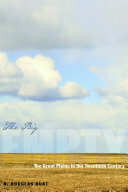
The Great Plains, known for grasslands that stretch to the horizon, is a difficult region to define. Some classify it as the region beginning in the east at the ninety-eighth or one-hundredth meridian. Others identify the eastern boundary with annual precipitation lines, soil composition, or length of the grass. In The Big Empty, leading historian R. Douglas Hurt defines this region using the towns and cities—Denver, Lincoln, and Fort Worth—that made a difference in the history of the environment, politics, and agriculture of the Great Plains. Using the voices of women homesteaders, agrarian socialists, Jewish farmers, Mexican meatpackers, New Dealers, and Native Americans, this book creates a sweeping survey of contested race relations, radical politics, and agricultural prosperity and decline during the twentieth century. This narrative shows that even though Great Plains history is fraught with personal and group tensions, violence, and distress, the twentieth century also brought about compelling social, economic, and political change. The only book of its kind, this account will be of interest to historians studying the region and to anyone inspired by the story of the men and women who found an opportunity for a better life in the Great Plains.